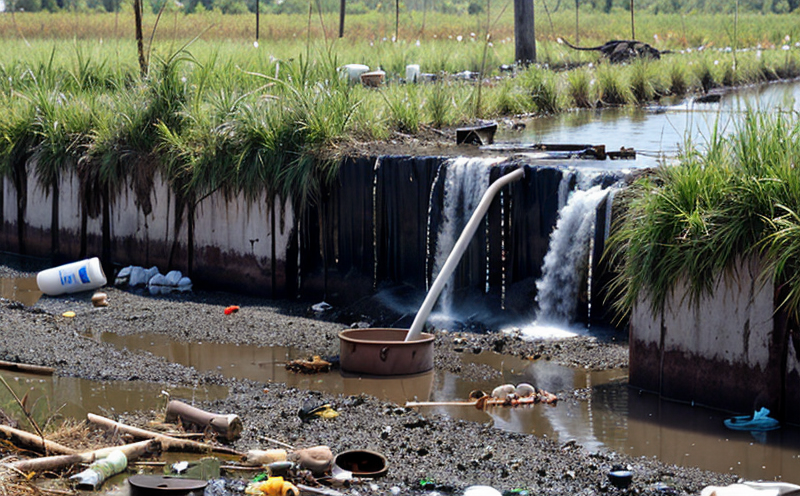Gasoline Pollutant Testing
The testing of gasoline pollutants is a critical aspect in environmental and quality control sectors. Ensuring that fuels meet stringent regulations not only protects human health but also safeguards the environment from harmful emissions. This service involves analyzing various components within gasoline that can contribute to air pollution, such as volatile organic compounds (VOCs), benzene, toluene, ethylbenzene, xylene isomers (BTEX), and polycyclic aromatic hydrocarbons (PAHs).
Our laboratory utilizes advanced analytical techniques to identify and quantify these pollutants. We employ gas chromatography-mass spectrometry (GC-MS) for accurate detection of volatile compounds and high-performance liquid chromatography (HPLC) for the analysis of PAHs. These methods ensure precise measurement, repeatability, and reliability of results.
Preparation of gasoline samples is a crucial step in this process. Samples must be representative of the fuel being tested to provide accurate data. This involves extracting relevant fractions from the gasoline matrix using appropriate solvents followed by concentration steps where necessary. The extracted compounds are then ready for injection into the GC-MS or HPLC instruments.
Our team follows international standards such as ISO 16540 and ASTM D3960 to ensure compliance with industry norms. These standards provide a framework for consistent testing procedures, which is essential in generating reliable data that can be used by regulatory bodies and stakeholders alike. By adhering to these guidelines, we guarantee that our results are both accurate and defensible.
The importance of this service cannot be overstated. In the context of environmental pollution control, gasoline pollutant testing helps identify sources of pollution that could lead to violations of air quality standards. For quality managers and R&D engineers involved in refining processes, understanding these pollutants is vital for optimizing production methods while minimizing adverse effects on public health and ecosystems.
In addition to its regulatory compliance benefits, this service also supports supply chain integrity by providing assurance that purchased fuels meet specified purity levels. Compliance officers benefit from having robust data at their disposal when negotiating contracts or auditing suppliers. This information can help them make informed decisions regarding procurement practices aimed at reducing risks associated with non-compliant fuel purchases.
Moreover, the ability to track changes over time through regular testing provides valuable insights into trends and potential issues within supply chains. Such knowledge allows proactive measures to be taken before problems escalate into larger issues affecting both operational efficiency and sustainability goals.
The precision and accuracy achieved by our laboratory ensure that clients receive comprehensive reports detailing all detected pollutants along with their respective concentrations. This transparency fosters trust between stakeholders and supports decision-making processes related to fuel quality assurance programs.
Applied Standards
In conducting gasoline pollutant testing, we adhere strictly to international standards which provide a benchmark for consistent and reliable results. For instance, ISO 16540 specifies the sampling procedures used in collecting representative samples of gasoline from various sources such as retail outlets or distribution centers.
ASTM D3960 outlines specific methods for determining benzene content in motor fuel, while EN 228 details the composition requirements for road diesel fuels. These standards are integral to ensuring that our testing aligns with recognized best practices globally.
The use of these standards ensures that our results can be trusted not only within local markets but also across international borders where cross-border trade in petroleum products is common. By following these guidelines, we contribute to the harmonization of testing protocols worldwide, thereby facilitating smoother transactions and better collaboration among industry players.
Quality and Reliability Assurance
At our laboratory, quality and reliability assurance are paramount in delivering accurate gasoline pollutant test results. We employ state-of-the-art equipment maintained by trained technicians who adhere to strict protocols throughout every stage of the testing process.
The laboratory is equipped with advanced gas chromatographs and mass spectrometers capable of detecting extremely low levels of pollutants, ensuring that no trace amounts go unnoticed. Regular calibration checks ensure that all instruments operate within specified tolerances, maintaining consistent performance over time.
Data processing software plays a key role in transforming raw instrument data into meaningful output suitable for report generation. This software incorporates algorithms designed specifically for handling complex mixtures like gasoline, allowing us to extract relevant information accurately and efficiently.
We maintain comprehensive documentation of all testing activities, including sample collection methods, analytical procedures followed, and final results reported. This documentation serves as a reference point for internal quality audits conducted periodically by our management team. It also facilitates external audits by regulatory authorities or third-party assessors if required.
Our commitment to continuous improvement extends beyond technical aspects into areas like personnel development and facility upgrades. Regular training sessions are organized for staff members to stay updated on latest advancements in analytical techniques and related standards. Additionally, investments are made towards acquiring new equipment that enhances our capabilities further.
International Acceptance and Recognition
The importance of international acceptance cannot be overstated when it comes to gasoline pollutant testing services offered by reputable laboratories like ours. Our rigorous adherence to global standards has earned us recognition from various stakeholders including governments, private sector entities, and academic institutions around the world.
Our laboratory holds accreditations from organizations such as ISO/IEC 17025:2017 which certifies that our testing capabilities meet specified criteria for technical competence. This accreditation ensures compliance with recognized international norms set forth by bodies like International Organization for Standardization (ISO) and International Electrotechnical Commission (IEC).
Government agencies from different countries often rely on data generated through tests conducted using ISO/IEC 17025 accredited laboratories when making policy decisions or enforcing regulations. Private enterprises also seek out such labs because they know the results will be accepted without question by clients located abroad.
A growing number of universities incorporate our laboratory into their research projects focused on fuel quality assessment and environmental impact studies. Collaboration with these academic institutions further solidifies our reputation as a leader in this field, allowing us to contribute significantly towards advancing knowledge within the industry.





